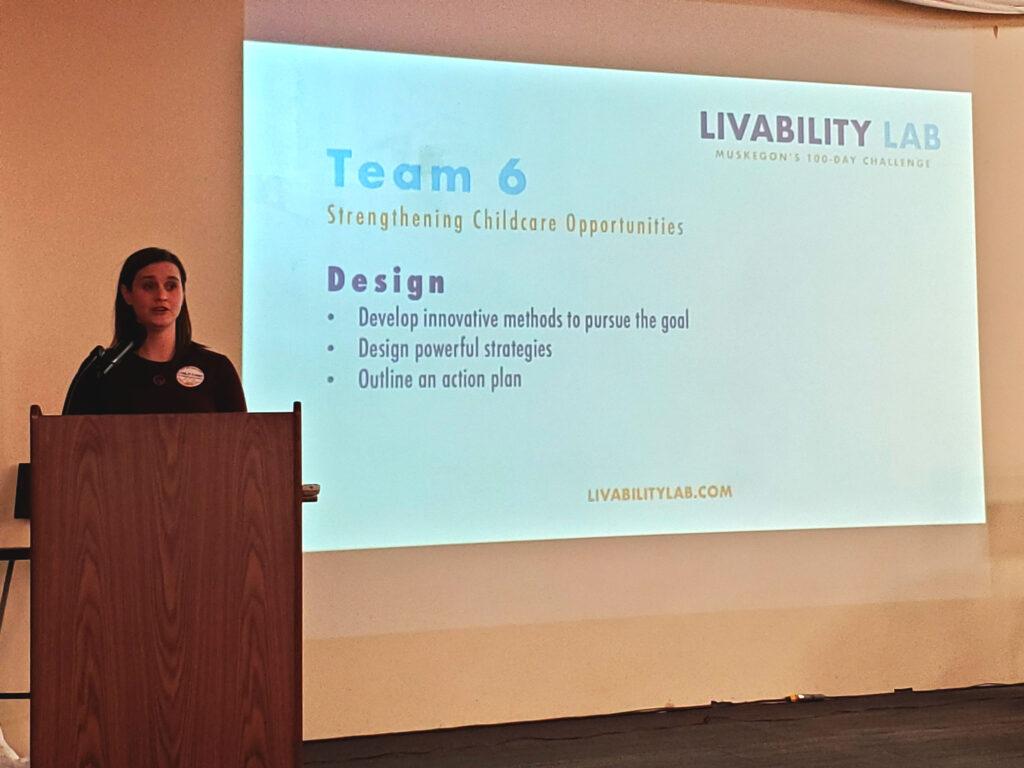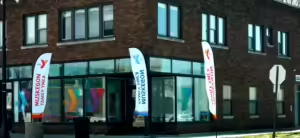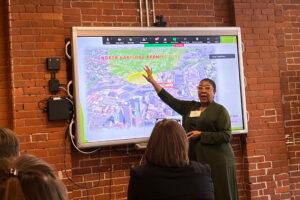
New Beginnings: Looking Forward from the 10-year Wellville Project
An open letter to our Wellville communities, partners and friends: On my hike early this morning, I paused for a moment – immersed in stillness,
Muskegon County lies about halfway up the eastern shore of Lake Michigan, a one-hour drive northwest from Grand Rapids and a three-hour drive from Chicago. The city of Muskegon grew up around the fur and lumber trades, and later sprouted foundries and other manufacturing concerns. In the early 20th century, Muskegon was home to more millionaires than any other town in America.
Today the largest employers are the health care system, local government, and manufacturing firms including GE Aviation and Howmet Aerospace. Local higher education options include Baker College and Muskegon Community College. The county is a regional destination for summer tourists, who come to sail or visit its 27 miles of beaches – including Pere Marquette Beach, the largest free public beach on the eastern shore of Lake Michigan – and Michigan’s Adventure, the state’s largest amusement park.
Overall, community health metrics reflect unfavorable and unevenly distributed social assets. Muskegon Heights, which has a much higher percentage of poor and minority residents, is way behind. At the same time, racial equity is often an afterthought (despite official policies). County-wide, key health and well-being issues include obesity and diabetes, tobacco and drug use, limited access to healthy food, adverse childhood experiences (ACEs), poor mental health – all exacerbated by and often due to racial inequity.
We originally came to Muskegon at the invitation of 1 in 21, a committee formed by the Muskegon Rotary Club in partnership with Muskegon County Public Health. That effort eventually disbanded, but many of its most active members continue to reach across a diverse range of urban and rural towns, races and ethnicities, political parties, income and education levels to work on community health and long-term well-being.
Just like in our other communities, working together has strengthened the social fabric in Muskegon. And, of course, there’s more work to do, especially to address the uneven access to resources among the county’s many different populations.
Sometimes collaboration starts with motivating metrics – like Muskegon’s high obesity rate, which is one of the community health risks the Muskegon YMCA and partners are addressing through the Diabetes Prevention Program. DPP has expanded in virtual form to YMCAs across the state, serving more than 1,300, and generating measurable results.
Similarly, the growing unmet need for child care was a catalyst for Muskegon’s innovative Tri-Share Child Care, which splits the cost of high-quality, affordable child care equally among the employer, the employee and the State of Michigan. Tri-Share is also now a statewide model.
Community leaders and organizations are partnering on a range of other initiatives as well: from neighborhood associations to community organizing; from economic development to food entrepreneurship; from maternal health to trauma-informed training.
One of the efforts cultivating greater collaboration in Muskegon is Livability Lab, an annual process where community members generate ideas to improve wellbeing, form action teams and make meaningful progress during a 100-day challenge. The process kicks off each year by reporting to the community – using data and resident voices – how Muskegon is doing on essential elements of livability, depicted here in the orange and blue Livability Lab framework. This includes health and education, transportation and housing, safety and security, social connections and trust, and more.
The Livability Lab process, which is about to enter its fifth cycle, has already produced dozens of self-organized action teams…with hundreds of community members across neighborhoods, organizations and experiences…working together on small projects that lead to big improvements in livability for all in Muskegon County.
One of those action teams created How YOU Birth Doulas, which trains doulas, helps them find clients and earn reimbursement so they can provide birthing support, mostly to persons of color. Together they are actively addressing the 49% of Black births that have less than adequate prenatal and postnatal care.
And by the way, the first 2025 baby born with How YOU Birth support, arrived on January 1. She’s a girl!

Community health & job readiness: The United Way of the Lakeshore, led by Christine Robere and with its board chaired by Superintendent of Schools John Severson, is shifting towards longer-term thinking in its operations.
Their two big themes are improving mental health and fostering meaningful employment. In short, how can the community:
The basic idea would be to fund longer-term, joint initiatives, reducing the incentive to compete and encouraging institutions to work together and enhance complementary capabilities. More money would go into the work and less into grant-writing.
Diabetes prevention: In partnership with Trinity Health, the Muskegon YMCA won part of a 5-year grant from the Centers for Disease Control to scale the YMCA’s Diabetes Prevention Program. To fuel the expansion, it has set up electronic referral systems for its physician partners at Mercy Health, Muskegon Family Care, Hackley Community Care and Affinia Health Network, among others. In addition, it is getting referrals from the local Walmart stores. This expansion will also enable help the program to achieve full CDC recognition and therefore become eligible for Medicare reimbursement.
Meanwhile, the Y has made lemonade from the COVID lemons, and is delivering the same programming (with different counselors) online through many YMCAs throughout Michigan.
Resilience and trauma-informed care: Led by HealthWest, the Resilience Muskegon action team is in its third year. Its trauma-sensitive schools initiative runs quarterly professional learning events and a school leadership roundtable for its trauma-sensitive schools initiative. On May 31 it held ReCon: A Veteran’s Resilience Summit, with Dr. Vincent Felitti (co-principal investigator of the original ACEs study) as keynote speaker. The team also has ongoing efforts to train community members in ACEs and resilience. Future plans include trauma-sensitive organizational assessments and planning.

An open letter to our Wellville communities, partners and friends: On my hike early this morning, I paused for a moment – immersed in stillness,

This is the story of how the Muskegon YMCA, long a pillar of the community of Muskegon County, MI, wove itself into a broader supporting fabric, reaching out beyond a physical building to serve community members in the community.

At Wellville, we use our basic quadrant chart not so much to describe ourselves, but to explore the mindset shift we want to foster. Our two axes are “short-term thinking” vs. “long-term thinking,” and “benefits just me” vs. “benefits all,” otherwise called “self-interest” vs. “shared interest.”
Population: 173,566
No Data Found
Land area (sq. mi): 499.25
Median age: 39.3
Median household income
No Data Found
2019 data
Poverty rate
No Data Found
2019 data
High school graduation rate
No Data Found
2019 data
Severe housing problems *
No Data Found
* Percentage of households with at least 1 of 4 housing problems: overcrowding, high housing costs, lack of kitchen facilities, or lack of plumbing facilities (2013-2017).
Adult obesity
No Data Found
2017 data
Adult smoking
No Data Found
2018 data
Years of potential life lost *
No Data Found
* Years of potential life lost before age 75 per 100,000 population. Data covers 2017-2019.
Uninsured *
No Data Found
* Persons under the age of 65 (2019 data)
Per capita Medicare spending *
No Data Found
* As a percentage of insured; does not include uninsured. Data from 2019.
Insurance sources
No Data Found
2019 data
Site Created By: MJ Web Consulting
| Cookie | Duration | Description |
|---|---|---|
| cookielawinfo-checkbox-analytics | 11 months | This cookie is set by GDPR Cookie Consent plugin. The cookie is used to store the user consent for the cookies in the category "Analytics". |
| cookielawinfo-checkbox-functional | 11 months | The cookie is set by GDPR cookie consent to record the user consent for the cookies in the category "Functional". |
| cookielawinfo-checkbox-necessary | 11 months | This cookie is set by GDPR Cookie Consent plugin. The cookies is used to store the user consent for the cookies in the category "Necessary". |
| cookielawinfo-checkbox-others | 11 months | This cookie is set by GDPR Cookie Consent plugin. The cookie is used to store the user consent for the cookies in the category "Other. |
| cookielawinfo-checkbox-performance | 11 months | This cookie is set by GDPR Cookie Consent plugin. The cookie is used to store the user consent for the cookies in the category "Performance". |
| viewed_cookie_policy | 11 months | The cookie is set by the GDPR Cookie Consent plugin and is used to store whether or not user has consented to the use of cookies. It does not store any personal data. |